Unit5THEMONSTER课文翻译大学英语六
unit5themonster课文翻译大学英语六
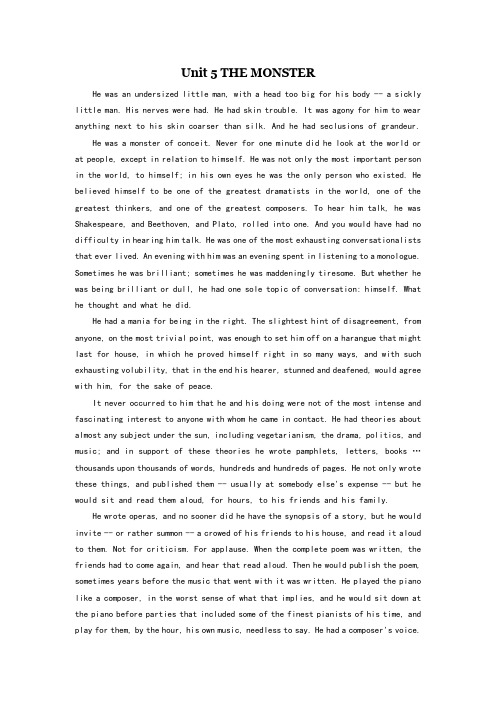
Unit 5 THE MONSTERHe was an undersized little man, with a head too big for his body -- a sickly little man. His nerves were had. He had skin trouble. It was agony for him to wear anything next to his skin coarser than silk. And he had seclusions of grandeur. He was a monster of conceit. Never for one minute did he look at the world or at people, except in relation to himself. He was not only the most important person in the world, to himself; in his own eyes he was the only person who existed. He believed himself to be one of the greatest dramatists in the world, one of the greatest thinkers, and one of the greatest composers. To hear him talk, he was Shakespeare, and Beethoven, and Plato, rolled into one. And you would have had no difficulty in hearing him talk. He was one of the most exhausting conversationalists that ever lived. An evening with him was an evening spent in listening to a monologue. Sometimes he was brilliant; sometimes he was maddeningly tiresome. But whether he was being brilliant or dull, he had one sole topic of conversation: himself. What he thought and what he did.He had a mania for being in the right. The slightest hint of disagreement, from anyone, on the most trivial point, was enough to set him off on a harangue that might last for house, in which he proved himself right in so many ways, and with such exhausting volubility, that in the end his hearer, stunned and deafened, would agree with him, for the sake of peace.It never occurred to him that he and his doing were not of the most intense and fascinating interest to anyone with whom he came in contact. He had theories about almost any subject under the sun, including vegetarianism, the drama, politics, and music; and in support of these theories he wrote pamphlets, le tters, books … thousands upon thousands of words, hundreds and hundreds of pages. He not only wrote these things, and published them -- usually at somebody else's expense -- but he would sit and read them aloud, for hours, to his friends and his family.He wrote operas, and no sooner did he have the synopsis of a story, but he would invite -- or rather summon -- a crowed of his friends to his house, and read it aloud to them. Not for criticism. For applause. When the complete poem was written, the friends had to come again, and hear that read aloud. Then he would publish the poem, sometimes years before the music that went with it was written. He played the piano like a composer, in the worst sense of what that implies, and he would sit down at the piano before parties that included some of the finest pianists of his time, and play for them, by the hour, his own music, needless to say. He had a composer's voice.And he would invite eminent vocalists to his house and sing them his operas, taking all the parts.He had the emotional stability of a six-year-old child. When he felt out of sorts, he would rave and stamp, or sink into suicidal gloom and talk darkly of going to the East to end his days as a Buddhist wonk. Ten minutes later, when something pleased him, he would rush out of doors and run around the garden, or jump up and down on the sofa, or stand on his head. He could be grief-stricken over the death of a pet dog, and he could be callous and heartless to a degree that would have made a Roman emperor shudder.He was almost innocent of any sense of responsibility. Not only did he seem incapable of supporting himself, but it never occurred to him that he was under ay obligation to do so. He was convinced that the world owed him a living. In support of this belief, he borrowed money from everybody who was good for a loan -- men, women, friends, or strangers. He wrote begging letters by the score, sometimes groveling without shame, at other loftily offering his intended benefactor the privilege of contributing to his support, and being mortally offended if the recipient declined the honor. I have found no record of his ever paying or repaying money to anyone who did not have a legal claim upon it.What money he could lay his hands on he spent like an Indian rajah. The mere prospect of a performance of one of his operas was enough to set him to running up bills amounting to ten times the amount of his prospective royalties. No one will ever know -- certainly he never knew -- how much money he owed. We do know that his greatest benefactor gave him $6,000 to pay the most pressing of his debts in one city, and a year later had to give him $16,000 to enable him to live in another city without being thrown into jail for debt.He was equally unscrupulous in other ways. An endless procession of women marched through his life. His first wife spent twenty years enduring and forgiving his infidelities. His second wife had been the wife of his most devoted friend and admirer, from whom he stole her. And even while he was trying to persuade her to leave her first husband he was writing to a friend to inquire whether he could suggest some wealthy woman -- any wealthy woman -- whom he could marry for her money.He was completely selfish in his other personal relationships. His liking for his friends was measured solely by the completeness of their devotion to him, or by their usefulness to him, whether financial or artistic. The minute they failed him -- even by so much as refusing dinner invitation -- or began to lessen inusefulness, he cast them off without a second thought. At the end of his life he had exactly one friend left whom he had known even in middle age.The name of this monster was Richard Wagner. Everything that I have said about him you can find on record -- in newspapers, in police reports, in the testimony of people who knew him, in his own letters, between the lines of his autobiography. And the curious thing about this record is that it doesn't matter in the least. Because this undersized, sickly, disagreeable, fascinating little man was right all the time. The joke was on us. He was one of the world's greatest dramatists; he was a great thinker; he was one of the most stupendous musical geniuses that, up to now, the world has ever seen. The world did owe him a living.When you consider what he wrote -- thirteen operas and music dramas, eleven of them still holding the stage, eight of them unquestionably worth ranking among the world's great musico-dramatic masterpieces -- when you listen to what he wrote, the debts and heartaches that people had to endure from him don't seem much of a price. Think of the luxury with which for a time, at least, fate rewarded Napoleon, the man who ruined France and looted Europe; and then perhaps you will agree that a few thousand dollars' worth of debts were not too heavy a price to pay for the Ring trilogy. What if he was faithless to his friends and to his wives He had one mistress to whom he was faithful to the day of his death: Music. Not for a single moment did he ever compromise with what he believed, with what be dreamed. There is not a line of his music that could have been conceived by a little mind. Even when he is dull, or downright bad, he is dull in the grand manner. There is greatness about his worst mistakes. Listening to his music, one does not forgive him for what he may or may not have been. It is not a matter of forgiveness. It is a matter of being dumb with wonder that his poor brain and body didn't burst under the torment of the demon of creative energy that lived inside him, struggling, clawing, scratching to be released; tearing, shrieking at him to write the music that was in him. The miracle is that what he did in the little space of seventy years could have been done at all, even by a great genius. Is it any wonder that he had no time to be a man怪才他身材矮小,同他的身体相比,头却很大——他是一个常生病的小个子。
高中英语外研社选修六模块五 课文原文译文
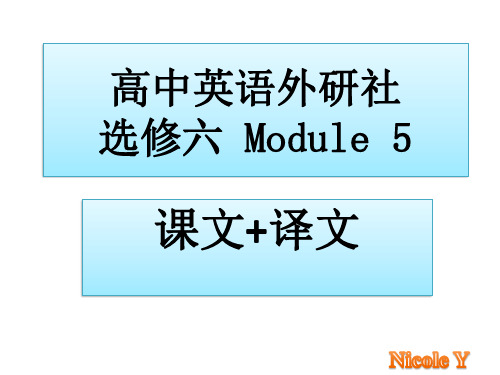
You cannot imagine the horror of that face! I had seen him when he was unfinished – he was ugly then. But when he stood up and moved, he became a creature from my worst nightmares.
弗兰肯斯坦的怪物 第一部分 《弗兰肯斯坦》的故事 弗兰肯斯坦是瑞士日内瓦一位年轻科学家的名字。 还在上大学时,他就发现了怎样创造生命的秘密。 利用死人的骨头,他制造出一个像人的怪物,并赋 予了它生命。那个怪物异乎寻常地高大、强壮,并 且极其丑陋,所有的人见了它都感到害怕。但是, 怪物却有着人类的智力和情感(emotion),并学会了 说话。由于找不到任何朋友,他感到非常孤独和难 过,并开始憎恨创造他的那个人——弗兰肯斯坦。
and I thought I held the body of my dead mother in
my with fear. At that same moment, I saw the creature that I had created. He was standing by my bed and watching me. His mouth opened and he made a sound, then seemed to smile. I think he wanted to speak, but I did not hear. He put out a hand, as if he wanted to keep me there, but I ran out of the room. I hid in the garden and stayed there till morning, terrified by what I had done. Again and again I thought, ―I wish I had not done this terrible thing, I wish I was dead!‖
The_Monster课文翻译
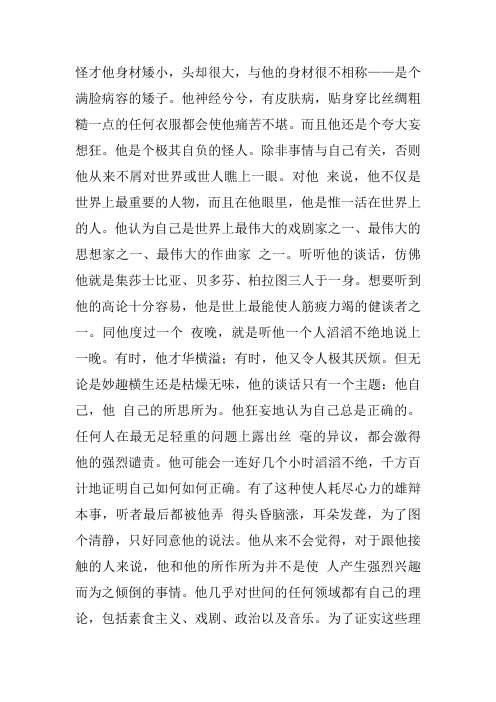
怪才他身材矮小,头却很大,与他的身材很不相称——是个满脸病容的矮子。
他神经兮兮,有皮肤病,贴身穿比丝绸粗糙一点的任何衣服都会使他痛苦不堪。
而且他还是个夸大妄想狂。
他是个极其自负的怪人。
除非事情与自己有关,否则他从来不屑对世界或世人瞧上一眼。
对他来说,他不仅是世界上最重要的人物,而且在他眼里,他是惟一活在世界上的人。
他认为自己是世界上最伟大的戏剧家之一、最伟大的思想家之一、最伟大的作曲家之一。
听听他的谈话,仿佛他就是集莎士比亚、贝多芬、柏拉图三人于一身。
想要听到他的高论十分容易,他是世上最能使人筋疲力竭的健谈者之一。
同他度过一个夜晚,就是听他一个人滔滔不绝地说上一晚。
有时,他才华横溢;有时,他又令人极其厌烦。
但无论是妙趣横生还是枯燥无味,他的谈话只有一个主题:他自己,他自己的所思所为。
他狂妄地认为自己总是正确的。
任何人在最无足轻重的问题上露出丝毫的异议,都会激得他的强烈谴责。
他可能会一连好几个小时滔滔不绝,千方百计地证明自己如何如何正确。
有了这种使人耗尽心力的雄辩本事,听者最后都被他弄得头昏脑涨,耳朵发聋,为了图个清静,只好同意他的说法。
他从来不会觉得,对于跟他接触的人来说,他和他的所作所为并不是使人产生强烈兴趣而为之倾倒的事情。
他几乎对世间的任何领域都有自己的理论,包括素食主义、戏剧、政治以及音乐。
为了证实这些理论,他写小册子、写信、写书……文字成千上万,连篇累牍。
他不仅写了,还出版了这些东西——所需费用通常由别人支付——而他会坐下来大声读给朋友和家人听,一读就是好几个小时。
他写歌剧,但往往是刚有个故事梗概,他就邀请——或者更确切说是召集——一群朋友到家里,高声念给大家听。
不是为了获得批评,而是为了获得称赞。
整部剧的歌词写好后,朋友们还得再去听他高声朗读全剧。
然后他就拿去发表,有时几年后才为歌词谱曲。
他也像作曲家一样弹钢琴,但要多糟有多糟。
然而,他却要坐在钢琴前,面对包括他那个时代最杰出的钢琴家在内的聚会人群,一小时接一小时地给他们演奏,不用说,都是他自己的作品。
Unit7TheMonster课文翻译综合教程四

Unit 7The Monst erDeems Taylor1He was an un dersized littleman, with a head too big for his body ― a sickly little man. His nerves were bad. He had skin tr ouble. It was ag ony for him to w ear anything nex t to his skin co arser than silk. And he had delu sions of grandeu r.2He was amonster of conce it. Never for on e minute did helook at the worl d or at people,except in relati on to himself. H e believed himse lf to be one ofthe greatest dra matists in the w orld, one of the greatest thinke rs, and one of t he greatest comp osers. To hear h im talk, he wasShakespeare, and Beethoven, andPlato, rolled in to one. He was o ne of the most e xhausting conver sationalists tha t ever lived.So metimes he was b rilliant; someti mes he was madde ningly tiresome. But whether hewas being brilli ant or dull, hehad one sole top ic of conversati on: himself. Wha t he thought and what he did.3He had a mania for being in th e right. The sli ghtest hint of d isagreement, fro m anyone, on the most trivial po int, was enoughto set him off o n a harangue tha t might last for hours, in which he proved himse lf right in so m any ways, and wi th such exhausti ng volubility, t hat in the end h is hearer, stunn ed and deafened, would agree wit h him, for the s ake of peace.4It never occur red to him thathe and his doing were not of the most intense an d fascinating in terest to anyone with whom he ca me in contact. H e had theories a bout almost anysubject under th e sun, including vegetarianism,the drama, polit ics, and music;and in support o f these theories he wrote pamphl ets, letters, bo oks ...thousand s upon thousands of words, hundr eds and hundreds of pages. He no t only wrote the se things, and p ublish ed them ―usually at someb ody else’s expen se ― but he woul d sit and read t hem aloud, for h ours, to his fri ends, and his fa mily.5He had the emotional s tability of a si x-year-old child. When he felt o ut of sorts, hewould rave and s tamp, or sink in to suicidal gloo m and talk darkl y of going to th e East to end hi s days as a Budd hist monk. Ten m inutes later, wh en something ple ased him he woul d rush out of do ors and run arou nd the garden, o r jump up and do wn off the sofa, or stand on his head. He couldbe grief-stricke n over the death ofa pet dog, a nd could be call ous and heartles s to a degree th at would have ma de aRoman emper or shudder.6He was almost in nocent of any se nse of responsib ility. He was co nvinced that theworld owed hima living. In sup port of this bel ief, he borrowed money from ever ybody who was go od for a loan ―men, women, frie nds, or stranger s. He wrote begg ing letters by t he score, someti mes groveling wi thout shame, atothers loftily o ffering his inte nded benefactorthe privilege of contributing to his support, an d being mortally offended if the recipient decli ned the honor.7What money he could lay his h and on he spentlike an Indian r ajah. No one wil l ever know ― ce rtainly he never knows ― how muc h money he owed. We do know that his greatest be nefactor gave hi m $6,000 to paythe most pressin g of his debts i n one city, anda year later had to give him $16,000 to enable h im to live in an other city witho ut being throwninto jail for de bt.8He was e qually unscrupul ous in other way s. An endless pr ocession of wome n marched throug h his life. Hisfirst wife spent twenty years en during and forgi ving his infidel ities. His secon d wife had beenthe wife of hismost devoted fri end and admirer, from whom he st ole her. And eve n while he was t rying to persuad e her to leave h er first husband he was writingto a friend to i nquire whether h e could suggestsome wealthy wom an ― any wealt hy woman ― whom he could marry for her money.9He had a geniusfor making enemi es. He would ins ult a man who di sagreed with him about the weath er. He would pul l endless wiresin order to meet some man who ad mired his work a nd was able andanxious to be of use to him ― an d would proceedto make a mortal enemy of him wi th some idioticand wholly uncal led-for exhibiti on of arroganceand bad manners. A character inone of his opera s was a caricatu re of one of the most powerful m usic critics ofhis day. Not con tent with burles quing him, he in vited the critic to his house an d read him the l ibretto aloud in front of his fr iends.10The n ame of this mons ter was RichardWagner. Everythi ng I have said a bout him you can find on record― in newspapers, in police repor ts, in the testi mony of people w ho knew him, inhis own letters, between the lin es of his autobi ography.And the curious thing a bout this record is that it does n’t matter in th e least.11Bec ause this unders ized, sickly, di sagreeable, fasc inating little m an was right all the time, the j oke was on us. H e was one of the world’s greates t dramatists; he was a great thi nker; he was one of the most stu pendous musicalgeniuses that, u p to now, the wo rld has ever see n. The world did owe him a livin g. What if he di d talk about him self all the tim e? If he talkedabout himself fo r twenty-four ho urs every day fo r the span of hi s life he wouldnot have uttered half the number of words that o thermen have sp oken and written about him since his death.12When you conside r what he wrote― thirteen opera s and music dram as, eleven of th em still holding the stage, eigh t of them unques tionably worth r anking among the wor ld’s great m usico-dramatic m asterpieces ― wh en you listen to what he wrote,the debts and he artaches that pe ople had to endu re from him don’t seem much of a price.13W hat if he was fa ithless to his f riends and to hi s wives? He hadone mistress towhom he was fait hful to the dayof his death: Mu sic. Not for a s ingle moment did he ever comprom ise with what he believed, withwhat he dreamed. There is not aline of his musi c that could hav e been conceived by a little min d. Even when heis dull, or down right bad, he is dull in the gra nd manner. Liste ning to his musi c, one does notforgive him forwhat he may or m ay not have been. It is not a ma tter of forgiven ess. It is a mat ter of being dum b with wonder th at his poor brai n and body didn’t burst under th e torment of the demon of creati ve energy that l ived inside him, struggling, cla wing, scratching to be released; tearing, shriek ing at him to wr ite the music th at was in him. T he miracle is th at what he did i n the little spa ce of seventy ye ars could have b een done at all, even by a great genius. Is it a ny wonder he had no time to be a man?畸人迪姆斯·泰勒1 他是个大头小身体、病怏怏的矬子;成日神经兮兮,皮肤也有毛病。
TheMonster课文翻译
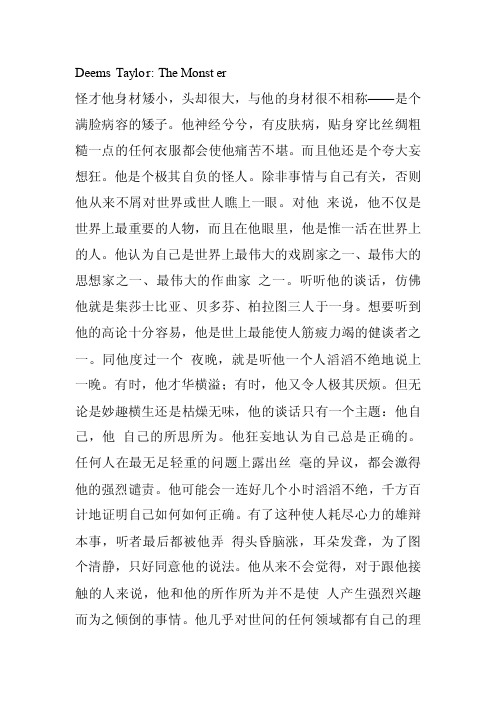
DeemsTaylor: The Monste r怪才他身材矮小,头却很大,与他的身材很不相称——是个满脸病容的矮子。
他神经兮兮,有皮肤病,贴身穿比丝绸粗糙一点的任何衣服都会使他痛苦不堪。
而且他还是个夸大妄想狂。
他是个极其自负的怪人。
除非事情与自己有关,否则他从来不屑对世界或世人瞧上一眼。
对他来说,他不仅是世界上最重要的人物,而且在他眼里,他是惟一活在世界上的人。
他认为自己是世界上最伟大的戏剧家之一、最伟大的思想家之一、最伟大的作曲家之一。
听听他的谈话,仿佛他就是集莎士比亚、贝多芬、柏拉图三人于一身。
想要听到他的高论十分容易,他是世上最能使人筋疲力竭的健谈者之一。
同他度过一个夜晚,就是听他一个人滔滔不绝地说上一晚。
有时,他才华横溢;有时,他又令人极其厌烦。
但无论是妙趣横生还是枯燥无味,他的谈话只有一个主题:他自己,他自己的所思所为。
他狂妄地认为自己总是正确的。
任何人在最无足轻重的问题上露出丝毫的异议,都会激得他的强烈谴责。
他可能会一连好几个小时滔滔不绝,千方百计地证明自己如何如何正确。
有了这种使人耗尽心力的雄辩本事,听者最后都被他弄得头昏脑涨,耳朵发聋,为了图个清静,只好同意他的说法。
他从来不会觉得,对于跟他接触的人来说,他和他的所作所为并不是使人产生强烈兴趣而为之倾倒的事情。
他几乎对世间的任何领域都有自己的理论,包括素食主义、戏剧、政治以及音乐。
为了证实这些理论,他写小册子、写信、写书……文字成千上万,连篇累牍。
他不仅写了,还出版了这些东西——所需费用通常由别人支付——而他会坐下来大声读给朋友和家人听,一读就是好几个小时。
他写歌剧,但往往是刚有个故事梗概,他就邀请——或者更确切说是召集——一群朋友到家里,高声念给大家听。
英语选修六u5课文翻译

英语选修六u5课文翻译英语选修六u5课文翻译翻译对很多学生来说,是最烦恼的题目,总是不知道怎么翻译。
以下是店铺整理的英语选修六u5课文翻译,欢迎阅读。
Caring for the earthAn Exciting Job my Job is the greatest Job in the world. Where I run is rare strange place, what I see is interesting people from all over the world, and sometimes the outdoor work, sometimes in the office, sometimes work with scientific instruments, sometimes want to meet with the local people and travel. But I never get bored. Although my work is occasionally dangerous, I don't care, because the danger inspires me and makes me feel alive. Most importantly, however, through my work I can protect people from one of the world's greatest natural powers, the threat of volcanoes.I am a volcanologist working at the Hawaii volcano observatory (HVO). My main task was to collect information about the kilauea volcano, one of the most active volcanoes in Hawaii. After gathering and assessing the information, I helped other scientists to predict where the next lava flow would flow and how fast it would flow. Our work has saved many lives, as the people can be notified of their leaving their homes as the lava flows through them. Unfortunately, it's impossible to move their homes away from the magma, so many houses are flooded or burned out.When boiling hot rocks from the volcanic eruption and back into the ground, it causes the loss is smaller than imagine, this is because the rock falling kilauea fire near the top of the mountain. The damage caused by the volcanic lava flows down the slopesis much greater, because the lava flows down and everything is buried under the lava. But the eruption itself was spectacular, and I'll never forget the first time I saw a volcano erupting. That was the second week after I arrived in Hawaii. I had a hard day's work that day and I went to bed early. I suddenly felt the bed shake when I was asleep, and then I heard a strange sound, as if a train had driven out of my window. I didn't care about the sound because I had experienced many earthquakes in Hawaii. I was just about to sleep again when suddenly my bedroom was as bright as day. I ran out of the room and into the back garden, where I could see kilauea from a distance. On the slopes, volcanoes erupt, red hot lava erupting like fountains, pouring hundreds of meters into the air. What a wonderful sight!On the second day of the eruption, I was lucky enough to make a close observation. I and two other sciences were sent to the top of the mountain to get off the top of the crater that formed during the eruption. Some special safety suits had been taken from the observation station earlier, so we put on our safety suits and approached the crater. The three of us looked like astronauts, and we all wore white protective suits over our bodies, helmets and special gloves, and a pair of big boots. It's not easy to wear these clothes on start, but we walked slowly to the edge of the crater and saw the red and red boiling center. In addition, they climbed down the crater to collect the magma for future research. I was the first to experience such a thing, so I stayed on top of the mountain to watch them.Today, I'm still as enthusiastic about my work as I was when I started work. Although I have been studying volcanism for more than 20 years, I am still amazed by the magnificent view of the volcano and its potential for great destructive power.The Lake of Heaven (tianchi) changbai mountain in northeast jilin province, this beautiful mountainous area is mostly dense forest area. Changbai mountain is the largest nature reserve in China, keeping its original state for the Chinese people and tourists from all over the world. The height of the ground varies from 700 to 2,000 meters above sea level. It is a growing area of many plants and animals. Rare animals have white cranes, black bears, leopards and Siberian tigers. Many people go to changbai mountain to study the unique flora and fauna. Others go to the mountains to see the magnificent waterfalls, or take a bath in the pool. The most attractive place in the reserve, however, is the tianchi, or lake in the sky.Tianchi is a deep water lake formed by the crater of a dead volcano on the top of the mountain. The lake has a height of 2,194 meters and water depth of more than 200 meters. In winter, the lake is frozen. It's about an hour from the end of the road to the top. When you get to the top of the mountain you will get a return - you can see not only the clear water of the sky, but also the 16 peaks surrounding the tianchi lake.There are many legends about tianchi, the most famous of which is the story of three young girls from the sky. They were bathing in the sky, and suddenly, a bird flew over their heads and dropped a small fruit on the dress of the youngest girl. When the girl picked up the fruit and wanted to smell it, the fruit flew into her mouth. The girl swallowed the fruit and became pregnant. After a while, she gave birth to a beautiful little boy. The boy is said to be the ancestor of the manchus, with a flair for language and a strong persuasion.If you are lucky enough to go to the pool with your loved one, don't forget to drop a coin into the clear blue water to makesure your love is as deep and enduring as the lake.“关地球”组织An Exciting Job 一份具有刺激性的工作我的工作是世界上最伟大的工作。
英语选修六unit5课文翻译
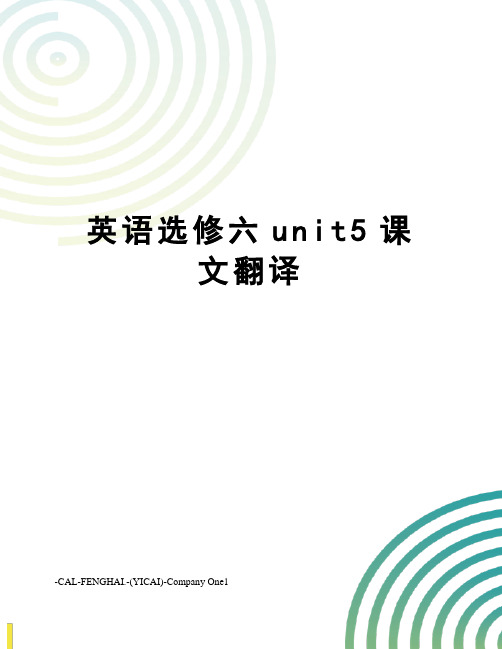
英语选修六u n i t5课文翻译-CAL-FENGHAI.-(YICAI)-Company One1Unit5 AN EXCITING JOB一份令人兴奋的工作I have the greatest job in the world. 我的工作是世界上最伟大的工作。
I travel to unusual places and work alongside people from all over the world. 我跑的地方是稀罕奇特的地方,和我一道工作的人来自世界各地。
Sometimes working outdoors,sometimes in an office, sometimes using scientific equipment and sometimes meeting local people and tourists, I am never bored. (我们)有时在室外工作,有时在办公室里,有时工作要用科学仪器,有时要会见当地百姓和旅游人士。
但是我从来不感到工作烦人。
Although my job is occasionally dangerous, I don't mind because danger excites me and makes me feel alive. 虽然我的工作偶尔也有危险,但是我并不在乎,因为能激励我,使我感到有活力。
However, the most important thing about my job is that I helpprotect ordinary people from one of the most powerful forces on earth - the volcano. 然而,最重要的是,通过我的工作能保护普通百姓免遭火山的威胁——这是世界上最大的自然威力之一。
I was appointed as a volcanologist working for the Hawaiian Volcano Observatory (HVO) twenty years ago. 作为一名火山学家,我被派到夏威夷火山观测站(HVO)工作。
新标准英语第六册课文及翻译
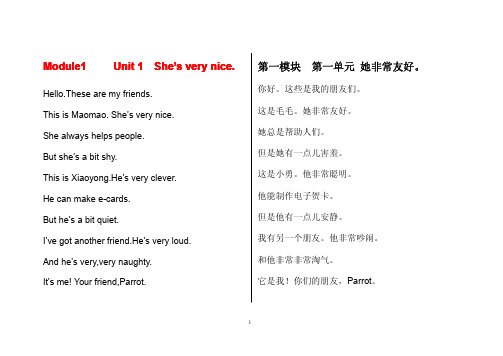
Module1Unit1SheShe’’s very nice. Hello.These are my friends.This is Maomao.She’s very nice.She always helps people.But she’s a bit shy.This is Xiaoyong.He’s very clever.He can make e-cards.But he’s a bit quiet.I’ve got another friend.He’s very loud.And he’s very,very naughty.It’s me!Your friend,Parrot.第一模块第一单元她非常友好。
你好。
这些是我的朋友们。
这是毛毛。
她非常友好。
她总是帮助人们。
但是她有一点儿害羞。
这是小勇。
他非常聪明。
他能制作电子贺卡。
但是他有一点儿安静。
我有另一个朋友。
他非常吵闹。
和他非常非常淘气。
它是我!你们的朋友,Parrot。
Unit2I’m going to help her.Activity1Parrot:My name’s Parrot.I’m helpful.This little girl can’t do her Maths.I’m going to help her.Girl:What’s ten plus eleven?Parrot:What’s ten plus ten?Girl:Twenty.Parrot:And one more?Girl:It’s twenty-one.Thank you,Parrot.第二单元我打算帮助她。
P:我的名字是Parrot。
我是有帮助的。
这个小女孩不会做她的数学题。
我打算帮助她。
G:十加十一等于几?P:十加十等于几?G:二十。
P:再加一个呢?G:是二十一。
谢谢你,Parrot。
Module2Unit1It It’’s very long. Look at this book.It’s about London.I’m from London.This river is very wide.And it’s very long.It’s the River Thames.It’s very tall.What is it?This is Big Ben.It’s a very old clock.And look at this big wheel.It’s very high.It’s new. It’s the London Eye.Eye?Like my eyes?Yes.It’s a big,round eye!Ahh!第二模块第一单元它非常长。
高二英语选修六第五单元第二篇课文翻译
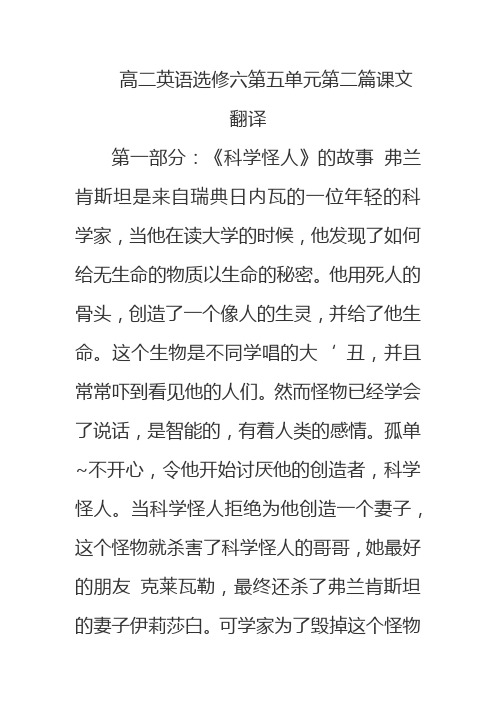
高二英语选修六第五单元第二篇课文翻译第一部分:《科学怪人》的故事弗兰肯斯坦是来自瑞典日内瓦的一位年轻的科学家,当他在读大学的时候,他发现了如何给无生命的物质以生命的秘密。
他用死人的骨头,创造了一个像人的生灵,并给了他生命。
这个生物是不同学唱的大‘丑,并且常常吓到看见他的人们。
然而怪物已经学会了说话,是智能的,有着人类的感情。
孤单~不开心,令他开始讨厌他的创造者,科学怪人。
当科学怪人拒绝为他创造一个妻子,这个怪物就杀害了科学怪人的哥哥,她最好的朋友克莱瓦勒,最终还杀了弗兰肯斯坦的妻子伊莉莎白。
可学家为了毁掉这个怪物追着怪物去了北极,但自己却死在了那里。
最后怪物消失在了冰雪里,结束了自己的生命。
第二部分:《科学怪人》摘选这是一个寒冷的11月的一天夜晚,我第一次看到了我的创作。
感觉非常紧张,我准备好了将会给躺在我脚下事物以生命的设备。
(在一天阴雨的早晨。
)我手里的蜡烛快燃尽了,突然借着它微弱的光,我看到这个生物的黄色眼睛睁开了。
我艰难的呼吸着,移开他的胳膊和腿。
当我看到这种情况的时候我不知道怎么形容我的心情。
我怎么来描述这个我费尽心思所创造的怪物呢?我设法是她美丽。
漂亮!她是我所见过的最丑的东西。
你可以透过他黄色的皮肤看到他的静脉。
他的头发是黑的,牙齿是白的。
但是这与他黄色的眼睛,布满皱纹的皮肤,黑色的嘴唇对比起来,相当恐怖。
我花了近两年的时间,仅仅给他的一个没有生命的胳膊以生命。
为此我都没有休息过,一直摧毁了我的身体。
我曾把它当做世界上最重要的东西。
但是现在,一切都结束了,我的美梦破灭了。
恐惧厌恶充满了身心。
现在我唯一的想法就是,“我希望自己从来没有创造这个生物,我希望我在世界的另一边,我希望往自己可以消失”当他转过头看我的时候,我感觉不能在跟他呆在同一个房间里面。
我冲了出去,在我的卧室里面走来走去呆了好长时间。
最后,我穿着衣服猛地躺在了床上,使者可以睡一会。
尽管睡着额,却做了可怕的梦。
我梦到了我的未婚妻,在我们镇上的街道上漫步。
外研英语选修6Module5-Frankenstein's-monster
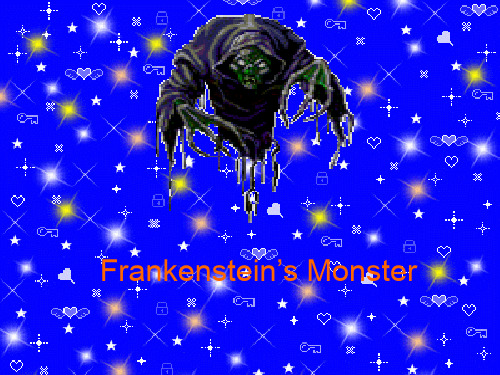
Read the passage again and answer the questions.
1. What do we learn about the monster’s appearance? He is very ugly, with wrinkled yellow skin and black lips.
On a cold November ntion of the monster (Para 3)
7
You could see the veins beneath
his yellow skin. His hair wUas
black and But these
2. Why was the young scientist so disgusted when he first saw the monster? Because he had wanted to create something beautiful, but it was ugly.
3. What had Frankenstein wanted more than anything in the world? To give life to a lifeless body.
7. Why did Frankenstein regret creating the monster?
Because he was terrified by it.
14
thhisintgesecthonwterarsetgewdhite.
horribly with his yellow eyles, his
wrinkled lips
yellow
skin
and
大学英语第五单元单词
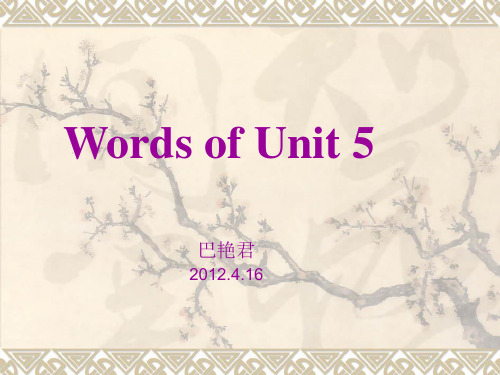
16.release
v t. release, as from one's grip释放;发射;让与;允许发表
Phrase :
release rate 释放率;释放速度 heat release 放热;热放出
Examples: :
Now, many aim to release at the same time around the world. 而现在,许多电影都是在世界范围内同时发布的。
5.pamphlet
n. a small book usually having a paper cover 小册子 Examples: : The pamphlet provides the essentials but nothing beyond. 这本小册子只有一些要点,没有其它内容。 Near-synonym :booklet, tract
3.tiresome
adj. so lacking in interest as to cause mental weariness烦人的, 无聊的;令人讨厌的 Examples: : Why you should expect it through the person of a steamy , devoted, often tiresome Jewess to find this kind of thing? 你为什么希望通过一个浑身冒着热气,忠心耿耿,却常常 令人讨厌的犹太女人来发现这种东西? Near-synonym : terrible, boring;
11.prospective
adj. concerned with or related to the future未来的;预期的 Phrase : prospective study 前瞻研究;预期研究;远景调查 prospective market 未来的市场 Examples: : She says any face time with new people can turn into a prospective business deal. 她说,任何同新鲜面孔打交道的机会都有可能转化为未来 的商业交易。 Near-synonym :expected, due, future
The-Monster课文翻译
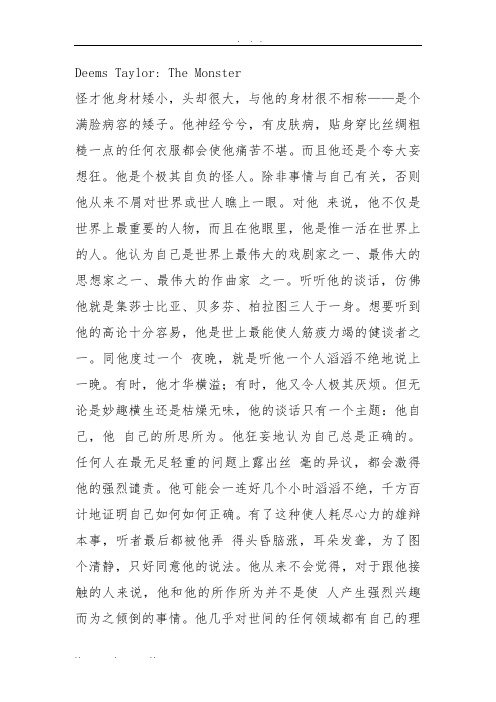
Deems Taylor: The Monster怪才他身材矮小,头却很大,与他的身材很不相称——是个满脸病容的矮子。
他神经兮兮,有皮肤病,贴身穿比丝绸粗糙一点的任何衣服都会使他痛苦不堪。
而且他还是个夸大妄想狂。
他是个极其自负的怪人。
除非事情与自己有关,否则他从来不屑对世界或世人瞧上一眼。
对他来说,他不仅是世界上最重要的人物,而且在他眼里,他是惟一活在世界上的人。
他认为自己是世界上最伟大的戏剧家之一、最伟大的思想家之一、最伟大的作曲家之一。
听听他的谈话,仿佛他就是集莎士比亚、贝多芬、柏拉图三人于一身。
想要听到他的高论十分容易,他是世上最能使人筋疲力竭的健谈者之一。
同他度过一个夜晚,就是听他一个人滔滔不绝地说上一晚。
有时,他才华横溢;有时,他又令人极其厌烦。
但无论是妙趣横生还是枯燥无味,他的谈话只有一个主题:他自己,他自己的所思所为。
他狂妄地认为自己总是正确的。
任何人在最无足轻重的问题上露出丝毫的异议,都会激得他的强烈谴责。
他可能会一连好几个小时滔滔不绝,千方百计地证明自己如何如何正确。
有了这种使人耗尽心力的雄辩本事,听者最后都被他弄得头昏脑涨,耳朵发聋,为了图个清静,只好同意他的说法。
他从来不会觉得,对于跟他接触的人来说,他和他的所作所为并不是使人产生强烈兴趣而为之倾倒的事情。
他几乎对世间的任何领域都有自己的理论,包括素食主义、戏剧、政治以及音乐。
为了证实这些理论,他写小册子、写信、写书……文字成千上万,连篇累牍。
他不仅写了,还出版了这些东西——所需费用通常由别人支付——而他会坐下来大声读给朋友和家人听,一读就是好几个小时。
他写歌剧,但往往是刚有个故事梗概,他就邀请——或者更确切说是召集——一群朋友到家里,高声念给大家听。
不是为了获得批评,而是为了获得称赞。
整部剧的歌词写好后,朋友们还得再去听他高声朗读全剧。
然后他就拿去发表,有时几年后才为歌词谱曲。
他也像作曲家一样弹钢琴,但要多糟有多糟。
然而,他却要坐在钢琴前,面对包括他那个时代最杰出的钢琴家在的聚会人群,一小时接一小时地给他们演奏,不用说,都是他自己的作品。
外研英语选修6Module5 Frankensteins monster

6. What did Frankenstein do after running out of the room for the second time? He hid in the garden because he was terrified by the monster and regretted having created him.
On a cold November night
Find the description of the monster (Para 3)
You could see the veins beneath
his yellow skin. His hair wUas
black and But these
2. Why was the young scientist so disgusted when he first saw the monster? Because he had wanted to create something beautiful, but it was ugly.
3. What had Frankenstein wanted more than anything in the world? To give life to a lifeless body.
dead mother in his arms.
Read the passage again and answer the questions.
1. What do we learn about the monster's appearance? He is very ugly, with wrinkled yellow skin and black lips.
The_Monster课文翻译
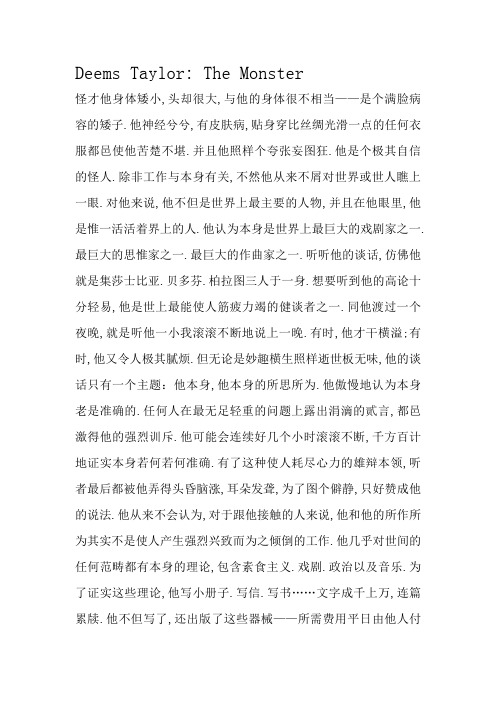
Deems Taylor: The Monster怪才他身体矮小,头却很大,与他的身体很不相当——是个满脸病容的矮子.他神经兮兮,有皮肤病,贴身穿比丝绸光滑一点的任何衣服都邑使他苦楚不堪.并且他照样个夸张妄图狂.他是个极其自信的怪人.除非工作与本身有关,不然他从来不屑对世界或世人瞧上一眼.对他来说,他不但是世界上最主要的人物,并且在他眼里,他是惟一活活着界上的人.他认为本身是世界上最巨大的戏剧家之一.最巨大的思惟家之一.最巨大的作曲家之一.听听他的谈话,仿佛他就是集莎士比亚.贝多芬.柏拉图三人于一身.想要听到他的高论十分轻易,他是世上最能使人筋疲力竭的健谈者之一.同他渡过一个夜晚,就是听他一小我滚滚不断地说上一晚.有时,他才干横溢;有时,他又令人极其腻烦.但无论是妙趣横生照样逝世板无味,他的谈话只有一个主题:他本身,他本身的所思所为.他傲慢地认为本身老是准确的.任何人在最无足轻重的问题上露出涓滴的贰言,都邑激得他的强烈训斥.他可能会连续好几个小时滚滚不断,千方百计地证实本身若何若何准确.有了这种使人耗尽心力的雄辩本领,听者最后都被他弄得头昏脑涨,耳朵发聋,为了图个僻静,只好赞成他的说法.他从来不会认为,对于跟他接触的人来说,他和他的所作所为其实不是使人产生强烈兴致而为之倾倒的工作.他几乎对世间的任何范畴都有本身的理论,包含素食主义.戏剧.政治以及音乐.为了证实这些理论,他写小册子.写信.写书……文字成千上万,连篇累牍.他不但写了,还出版了这些器械——所需费用平日由他人付出——而他会坐下来大声读给同伙和家人听,一读就是好几个小时.他写歌剧,但往往是刚有个故事梗概,他就邀请——或者更确切说是召集——一群同伙到家里,大声念给大家听.不是为了获得批驳,而是为了获得赞扬.整部剧的歌词写好后,同伙们还得再去听他大声朗读全剧.然后他就拿去揭橥,有时几年后才为歌词谱曲.他也像作曲家一样弹钢琴,但要多糟有多糟.然而,他却要坐在钢琴前,面临包含他谁人时期最出色的钢琴家在内的聚首人群,一小时接一小时地给他们吹奏,不必说,都是他本身的作品.他有一副作曲家的嗓子,但他会把有名的歌颂家请到本身家里,为他们演唱本身的作品,还要扮演剧中所有的脚色.他的情感如同六岁儿童,极易摇动.心境不好时,他要么用力顿脚,口出大言,要么陷入极端的愁闷,阴森地说要去东方当僧人,了此残生.十分钟后,假若有什么工作使他愉快了,他就会冲出门去,绕开花圃跑个不断,或者在沙发上跳上跳下或拿大顶.他会因爱犬逝世了而极端哀思,也会残暴无情到使罗马皇帝也毛骨悚然.他几乎没有涓滴义务感.他似乎不但没有赡养本身的才能,也从没想到过有这个义务.他深信这个世界应当给他一条活路.为了支撑这一信心,他向一切借得着钱的人借债——不管是男是女,也不管是同伙照样陌路人.乞助信他一写就是二十封——有时卑恭屈节,掉落臂羞辱,有时又趾高气扬地授予他预期的赞助人赞助他的殊荣,如果对方拒绝这一声誉,他会气得要逝世.我还没见到假如借主不告上法庭他会自动付帐或还钱的记载.只要他能弄到钱,他花起来老是像个印度王公.只要他的某部歌剧一有上演的可能,他便会立时肆意花钱,敏捷积欠一笔十倍于预期所得版税的债务.没有人搞得清晰——他本身确定也不清晰——他欠了若干钱.但我们确切知道,他的一位最大方的赞助人曾给他六千美元清偿他在某市最急切的债务;一年之后,不克不及不再给他一万六千美元,使他得以在另一城市安身,而不致因负债去坐牢.他在其他方面也是放纵不羁.很多个女人曾进入过他的生涯.他的正室与他一路生涯了二十年,是在不断地忍耐和谅解他的不忠中渡过的.他的第二个老婆本是最崇拜他.对他最忠诚的同伙的老婆,他从石友手中夺走了她.他甚至在劝告她分开第一个丈夫之际,还同时写信给一个同伙,讯问可否给他介绍个阔妇人——有钱就行——他可认为了金钱跟她娶亲.他在其他私家交往中也极端自私.他对同伙有无好感,完整取决于他们对他是否绝对忠诚,抑或他们在经济上或艺术上对他是否有效.一旦他们使他掉望——即使是拒绝赴宴之类的小事——或者他们对他不再那么有效,他就会毫不迟疑地与他们拒却交往.在他性命的最后日子里,他只剩下了一个同伙,就连这个同伙也照样他在中年时才熟悉的.这位怪才的名字叫理查德·瓦格纳.我所谈到的关于他的一切情形都有记载可查——包含报纸.警方陈述.熟悉他的人的证词.他本身的信件以及他的自传.但令人奇异的是,这种记载对他的名望涓滴无损.因为,这个身体矮小.满脸病容.性格怪僻.令人入神的小个子自始至终都是对的.该受嘲笑的是我们.他是全世界最巨大的剧作家之一,一位巨大的思惟家,是迄今为止全世界最了不得的音乐天才之一.这个世界确切应当赡养他.当你掂量他的作品时——十三部歌剧和音乐剧,个中十一部仍然长演不衰,八部当之无愧地位于世界音乐剧巨大名作之列——当你凝听他的作品时,他负债不还也好,伤透人心也罢,这些代价似乎都不算什么.想一想命运至少曾一度赐给拿破仑,谁人葬送法国.洗劫欧洲的人何种的豪华吧.比拟之下,你也许会赞成,用几千元的债务来换得《指环》三部曲其实不太贵.即使他不忠于同伙和老婆,又有什么关系呢?他有一位他至逝世都忠贞不渝的情侣:音乐.他一刻也没有摇动过本身的信心和憧憬.他的作品中没有一行曲谱是平淡之辈构思得出的.即使他有逝世板乏味或极其糟糕的作品,其乏味中仍可见巨大之处.他最糟的败笔中也有不凡之处.人们凝听他的乐曲时,其实不因他也许曾是或不是什么样的人而饶恕他.这不是饶恕不饶恕的问题.这是件令人惊奇得木鸡之呆的工作——他体内无穷的创造力,像魔鬼般舍命挣扎.又挖又挠试图冲出体外;这恶魔撕扯着他,冲他狂叫,要他谱写出藏于体内的乐曲.遭遇如斯苦楚的熬煎,他那可怜的脑壳和身躯竟没有被压垮,这岂不是人世事业?而真正的事业在于,短短七十年,他居然完成了那么多的工作,即使是一个巨大的天才,也难以做到.是以他没有时光过常人的生涯,这又有什么好奇异的呢?。
unit 5 monster大学英语精读第六册

Background information:
• • About the text: This text first appeared as a radio talk, entitled A Monster. Later it was published with the title Of Men and Music in the United States in 1937. • About the author: • Deems Taylor, American musician and critic
Find out key words
• • • • • • Undersized (Para.1): Physically odd Conceit (Para.2) : self-pride Mania for being in the right (Para.3): Emotional stability of a child (Para.6): unstable Innocent of sense of responsibility (Para.7) Unscrupulous (Para.9): immoral, dishonest, without principles • Selfish (Para.10) • Why (para.12) • The author‟s attitude towards him
Who is the monster? (Richard Wagner) What key words indicate that he was a monster?
Using what you already know
• Richard Wagner: German composer, born in Leipzig on 22 May 1813 and died in Venice on 13 February 1883. he did more than any other composer to change music, and indeed to change the art and thinking about it. His works are hated as much as they are worshipped, but no one denies their greatness.
外研英语选修6Module5-Frankenstein's-monster
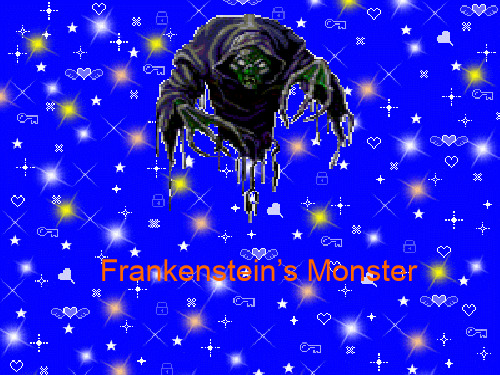
wrinkled lips
yellow
skin
and
yblack
2021/6/78Wat did Frankenstein dream ? (Para4)
2021/6/7
9
He dreamt he saw his fiancée walking in the streets of his town. She looked well and happy but as he kissed her lips, they became pale, as if she were dead. Her face changed and he thought he held the body of his
7. Why did Frankenstein regret creating the monster?
Because he was terrified by it.
2021/6/7
14
部分资料从网络收集整 理而来,供大家参考,
感谢您的关注!
__an_d_s_t_ro_n_g_a_n_d_e_x_tr_e_m_e_ly_u_g_l_y _____.
2. Frankenstein tries to destroy the monster because______it_k_il_ls_t_h_re_e_p_e_op_l_e _____.
2021/6/7
5
Read part2
Questions (Para2)
When did Frankenstein see the monster for the first time?
On a cold November night
2021/6/7
现代大学英语5-第六课--翻译
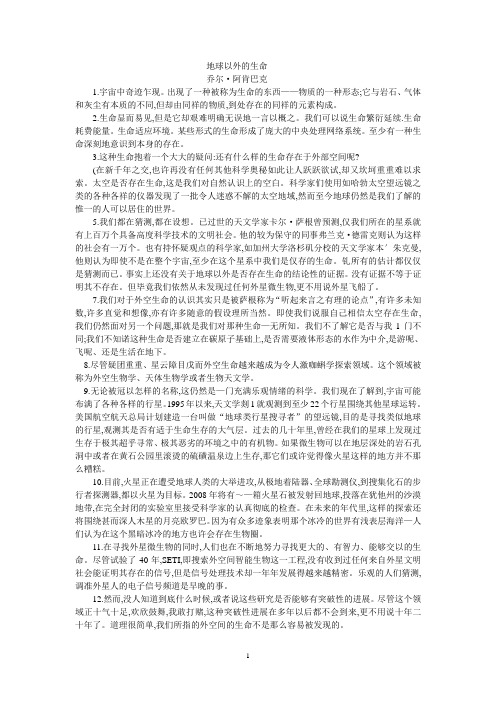
地球以外的生命乔尔·阿肯巴克1.宇宙中奇迹乍现。
出现了一种被称为生命的东西——物质的一种形态;它与岩石、气体和灰尘有本质的不同,但却由同祥的物质,到处存在的同祥的元素构成。
2.生命显而易见,但是它却艰难明确无误地一言以概之。
我们可以说生命繁衍延续.生命耗费能量。
生命适应环境。
某些形式的生命形成了庞大的中央处理网络系统。
至少有一种生命深刻地意识到本身的存在。
3.这种生命抱着一个大大的疑问:还有什么样的生命存在于外部空间呢?(在新千年之交,也许再没有任何其他科学奥秘如此让人跃跃欲试,却又坎坷重重难以求索。
太空是否存在生命,这是我们对自然认识上的空白。
科学家们使用如哈勃太空望远镜之类的各种各祥的仪器发现了一批令人迷惑不解的太空地域,然而至今地球仍然是我们了解的惟一的人可以居住的世界。
5.我们都在猜测,都在设想。
已过世的天文学家卡尔·萨根曾预测,仅我们所在的星系就有上百万个具备高度科学技术的文明社会。
他的较为保守的同事弗兰克·德雷克则认为这样的社会有一万个。
也有持怀疑观点的科学家,如加州大学洛杉矶分校的天文学家本′朱克曼,他则认为即使不是在整个宇宙,至少在这个星系中我们是仅存的生命。
钆所有的估计都仅仅是猜测而已。
事实上还没有关于地球以外是否存在生命的结论性的证据。
没有证据不等于证明其不存在。
但毕竟我们依然从未发现过任何外星微生物,更不用说外星飞船了。
7.我们对于外空生命的认识其实只是被萨根称为“听起来言之有理的论点”,有许多未知数,许多直觉和想像,亦有许多随意的假设理所当然。
即使我们说服自己相信太空存在生命,我们仍然面对另一个问题,那就是我们对那种生命—无所知。
我们不了解它是否与我1门不同;我们不知诺这种生命是否建立在碳原子基础上,是否需要液体形态的水作为中介,是游呢、飞呢、还是生活在地下。
8.尽管疑团重重、星云障目戊而外空生命越来越成为令人激咖蝌学探索领域。
这个领域被称为外空生物学、天体生物学或者生物天文学。
- 1、下载文档前请自行甄别文档内容的完整性,平台不提供额外的编辑、内容补充、找答案等附加服务。
- 2、"仅部分预览"的文档,不可在线预览部分如存在完整性等问题,可反馈申请退款(可完整预览的文档不适用该条件!)。
- 3、如文档侵犯您的权益,请联系客服反馈,我们会尽快为您处理(人工客服工作时间:9:00-18:30)。
Unit 5 THE MONSTERHe was an undersized little man, with a head too big for his body -- a sickly little man.His nerves were had. He had skin trouble. It was agony for him to wear anything next tohis skin coarser than silk. And he had seclusions of grandeur.He was a monster of conceit.Never for one minute did he look at the world or at people, except in relation to himself. He was not only the most important person in theworld,to himself;in his own eyes he was the only person who existed. He believed himself to be one of the greatest dramatists in the world, one of the greatest thinkers, andone of the greatest composers. To hear him talk, he was Shakespeare, and Beethoven, and Plato, rolled into one. And you would have had no difficulty in hearing him talk. He wasone of the most exhausting conversationalists that ever lived. An evening with him was anevening spent in listening to a monologue. Sometimes he was brilliant; sometimes he was maddeningly tiresome. But whether he was being brilliant or dull, he had one sole topicof conversation: himself. What he thought and what he did.He had a mania for being in the right.The slightest hint of disagreement,from anyone, on the most trivial point, was enough to set him off on a harangue that might lastfor house, in which he proved himself right in so many ways, and with such exhaustingvolubility, that in the end his hearer, stunned and deafened, would agree with him, for thesake of peace.It never occurred to him that he and his doing were not of the most intense and fascinating interest to anyone with whom he came in contact.He had theories about almost any subject under the sun, including vegetarianism, the drama, politics, and music;and in support of these theories he wrote pamphlets,le tters, books⋯ thousands upon thousands of words, hundreds and hundreds of pages. He not only wrote these things, and published them -- usually at somebody else's expense-- but he would sit and read them aloud, for hours, to his friends and his family.He wrote operas,and no sooner did he have the synopsis of a story, but he would invite -- or rather summon -- a crowed of his friends to his house, and read it aloud tothem. Not for criticism. For applause. When the complete poem was written, the friendshad to come again,and hear that read aloud.Then he would publish the poem, sometimes years before the music that went with it was written. He played the piano like a composer, in the worst sense of what that implies, and he would sit down at the pianobefore parties that included some of the finest pianists of his time, and play for them, bythe hour, his own music, needless to say. He had a composer's voice. And he wouldinvite eminent vocalists to his house and sing them his operas, taking all the parts.He had the emotional stability of a six-year-old child. When he felt out of sorts, hewould rave and stamp, or sink into suicidal gloom and talk darkly of going to the East toend his days as a Buddhist wonk.Ten minutes later,when something pleased him,he would rush out of doors and run around the garden, or jump up and down on the sofa, orstand on his head. He could be grief-stricken over the death of a pet dog, and he could becallous and heartless to a degree that would have made a Roman emperor shudder.He was almost innocent of any sense of responsibility.Not only did he seem incapable of supporting himself,but it never occurred to him that he was under ay obligation to do so. He was convinced that the world owed him a living. In support of thisbelief,he borrowed money from everybody who was good for a loan--men,women, friends, or strangers. He wrote begging letters by the score, sometimes groveling withoutshame, at other loftily offering his intended benefactor the privilege of contributing to hissupport, and being mortally offended if the recipient declined the honor. I have found norecord of his ever paying or repaying money to anyone who did not have a legal claim upon it.What money he could lay his hands on he spent like an Indian rajah.The mere prospect of a performance of one of his operas was enough to set him to running up bills amounting to ten times the amount of his prospective royalties. No one will ever know --certainly he never knew -- how much money he owed.We do know that his greatest benefactor gave him $6,000 to pay the most pressing of his debts in one city, and a yearlater had to give him $16,000 to enable him to live in another city without being throwninto jail for debt.He was equally unscrupulous in other ways. An endless procession of women marched through his life. His first wife spent twenty years enduring and forgiving his infidelities. His second wife had been the wife of his most devoted friend and admirer, from whom he stole her. And even while he was trying to persuade her to leave her firsthusband he was writing to a friend to inquire whether he could suggest some wealthy woman -- any wealthy woman -- whom he could marry for her money.He was completely selfish in his other personal relationships.His liking for his friends was measured solely by the completeness of their devotion to him,or by their usefulness to him, whether financial or artistic. The minute they failed him -- even by somuch as refusing dinner invitation -- or began to lessen in usefulness, he cast them offwithout a second thought. At the end of his life he had exactly one friend left whom hehad known even in middle age.The name of this monster was Richard Wagner.Everything that I have said abouthim you can find on record -- in newspapers, in police reports, in the testimony of peoplewho knew him, in his own letters, between the lines of his autobiography. And the curiousthing about this record is that it doesn't matter in the least.Because this undersized, sickly, disagreeable, fascinating little man was right all thetime. The joke was on us. He was one of the world's greatest dramatists; he was a greatthinker; he was one of the most stupendous musical geniuses that, up to now, the worldhas ever seen. The world did owe him a living.When you consider what he wrote--thirteen operas and music dramas,eleven of them still holding the stage,eight of them unquestionably worth ranking among the world's great musico-dramatic masterpieces--when you listen to what he wrote,the debts and heartaches that people had to endure from him don't seem much of a price. Think of the luxury with which for a time, at least, fate rewarded Napoleon, the man whoruined France and looted Europe; and then perhaps you will agree that a few thousanddollars' worth of debts were not too heavy a price to pay for the Ring trilogy.What if he was faithless to his friends and to his wives? He had one mistress to whomhe was faithful to the day of his death:Music.Not for a single moment did he ever compromise with what he believed, with what be dreamed.There is not a line of his music that could have been conceived by a little mind. Even when he is dull, or downrightbad,he is dull in the grand manner.There is greatness about his worst mistakes. Listening to his music, one does not forgive him for what he may or may not have been. Itis not a matter of forgiveness.It is a matter of being dumb with wonder that his poor brain and body didn't burst under the torment of the demon of creative energy that livedinside him,struggling,clawing, scratching to be released;tearing,shrieking at him to write the music that was in him.The miracle is that what he did in the little space of seventy years could have been done at all, even by a great genius. Is it any wonder that hehad no time to be a man?怪才他身材矮小,同他的身体相比,头却很大——他是一个常生病的小个子。
